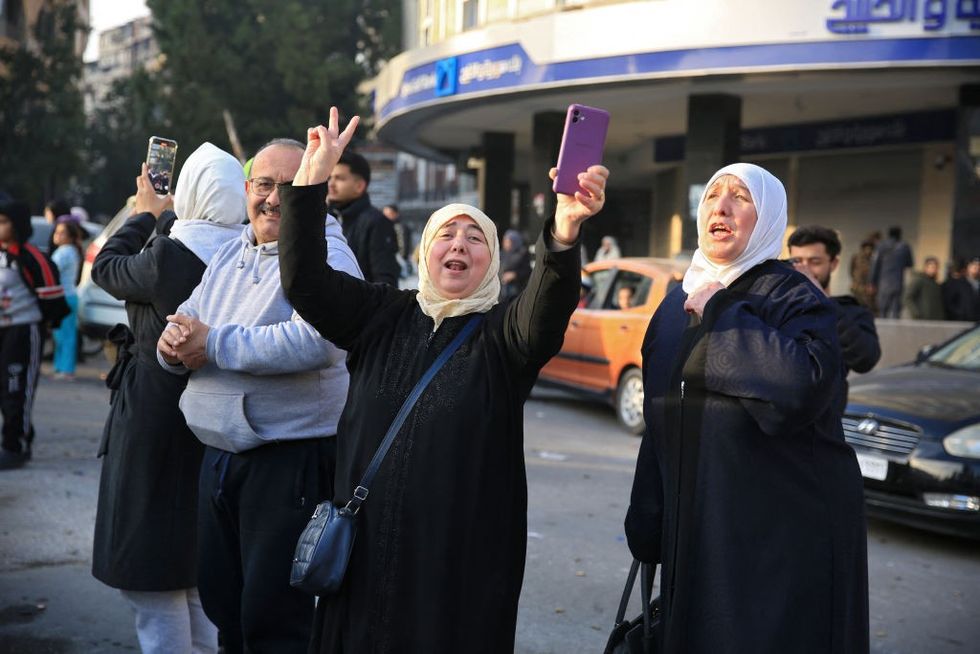The government of Syrian President Bashar al-Assad collapsed Sunday after rebels seized control of the capital following a stunning advance through major cities, prompting celebrations in the streets as the country's ousted leader fled.
"The city of Damascus has been liberated," rebel fighters declared on state TV. "The regime of the tyrant Bashar al-Assad has been toppled."
Video footage posted to social media showed rebels escorting Syrian Prime Minister Mohammad Ghazi al-Jalali to meet with their leaders. The prime minister said that "we are ready to cooperate" and called for free elections and the preservation of "all the properties of the people and the institutions of the Syrian state."
"They belong to all Syrians," he said.
The rebel movement was led by Hayat Tahrir al-Sham (HTS)—an Islamist organization that was once an affiliate of al-Qaeda—along with Turkish-backed Syrian militias. HTS is led by Abu Mohammad al-Jolani; the U.S. State Department has deemed him a "Specially Designated Global Terrorist" and is offering a reward of up to $10 million for information that results in his capture.
After the Assad government fell, ending a decades-long family dynasty, The Associated Pressreported that "revelers filled Umayyad Square in the city center, where the Defense Ministry is located."
"Men fired celebratory gunshots into the air and some waved the three-starred Syrian flag that predates the Assad government and was adopted by the revolutionaries," the outlet reported. "A few kilometers (miles) away, Syrians stormed the presidential palace, tearing up portraits of the toppled president. Soldiers and police officers left their posts and fled, and looters broke into the Defense Ministry. Videos from Damascus showed families wandering into the presidential palace, with some emerging carrying stacks of plates and other household items."
Prisons, including a notorious facility on the outskirts of Damascus that Amnesty International described as a "human slaughterhouse," were reportedly opened in the wake of Assad's ouster, with video footage showing detainees walking free.
"Literally seeing hundreds of people across Damascus, friends, family people I've known to be neutral and not involved in politics, all post green flags, all support this movement, people are tired, broken and angry, they want change and change is what they've got," Danny Makki, a non-resident scholar at the Middle East Institute who was on the ground in Damascus as the government fell, wrote on social media.
(Photo: Aref Tammawi/AFP via Getty Images)
Assad's whereabouts are not known; he left the country without issuing a statement. Reutersreported that the ousted president, "who has not spoken in public since the sudden rebel advance a week ago, flew out of Damascus for an unknown destination earlier on Sunday." (Update: Citing Russian state media, APreported that "Assad has arrived in Moscow with his family" and has been given asylum.")
Russia's Foreign Ministry said in a statement that "as a result of negotiations between B. Assad and a number of participants in the armed conflict on the territory of the Syrian Arab Republic, he decided to resign from the presidency and left the country, giving instructions for a peaceful transfer of power."
The explosion of Syria's civil war in recent days brought renewed focus to the current role of United States troops in the country. There are currently around 900 American forces in Syria alongside an unknown number of private contractors—troop presence that the Pentagon said it intends to maintain in the wake of Assad's ouster.
The U.S. has said it was not involved in the rebel offensive. In a social media post, a spokesperson for the White House National Security Council wrote that President Joe Biden and his team "are closely monitoring the extraordinary events in Syria and staying in constant touch with regional partners."
"The astonishing speed at which the Assad regime has crumbled exposes once again the inherent fragility of seemingly ironclad dictatorships, and of all governments whose rule is based on repression and corruption."
The U.S.-backed Israeli military said Sunday that it has "taken up new positions" in the occupied Golan Heights "as it prepared for potential chaos following the lightning-fast fall" of Assad, The Times of Israelreported.
"Syrian media reports said Israel had launched artillery shelling in the area," the outlet added.
Geir Pedersen, the United Nations' special envoy for Syria, said in a statement Sunday that Assad's fall "marks a watershed moment in Syria's history—a nation that has endured nearly 14 years of relentless suffering and unspeakable loss."
"The challenges ahead remain immense and we hear those who are anxious and apprehensive," said Pedersen. "Yet this is a moment to embrace the possibility of renewal. The resilience of the Syrian people offers a path toward a united and peaceful Syria."
Nancy Okail, president and CEO of the Center for International Policy, said Sunday that "today belongs to the people of Syria."
"The astonishing speed at which the Assad regime has crumbled exposes once again the inherent fragility of seemingly ironclad dictatorships, and of all governments whose rule is based on repression and corruption," said Okail. "The regime's fast disintegration shows how autocracy, resistance to political transitions, and gross atrocities and the lack of accountability for committing them ultimately doomed Assad's brutal rule. Ritualistic elections cannot replace legitimacy, which remains crucial for stability."
"True sovereignty cannot be attained under the influence of foreign powers that exploit nations as arenas for their own geopolitical competition," Okail added. "While Syria's future is for its people to determine, the United States and its partners should take immediate steps to facilitate delivery of humanitarian and reconstruction aid, and help ensure that future is free and democratic, and the rights of all of its communities are protected."
This story has been updated to include a statement from the Center for International Policy.



